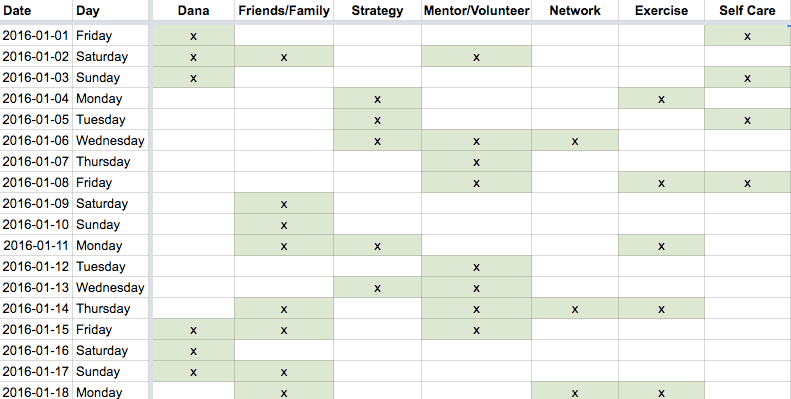Battling the Culture of Busy: Part 5 – Self-care
Learn three tactics that can help you be more intentional about making self-care a part of your life.

f the countermeasure to being busy is being intentional, then what can we do to be more intentional in how we choose to spend our time? In this 5 part series on Battling the Culture of Busy, I will provide organization tactics in the following areas: email, meetings, task management, prioritization, and self-care.
Back in April 2016, as part of the promotion of a workshop I was doing on time management, I was featured in Capital Ideas with the question: “What would you do with more time in your day?“. There were many different answers but the recurring themes for most people were around spending more time with family, giving time to causes that are important to them, or looking after themselves better. I think all of these things can be connected back to self-care in so far as they are ways that people fulfill themselves. If this is the case, what’s stopping everyone from spending more time on these things? Why is self-care only thought of as a nice-to-have?

Self-care is a choice
I think that part of the problem is that our days are often heavily prescribed, depending on our jobs and roles. We are set in routines that become second nature, rather than intentional. We get stuck in the hamster wheel of the day-to-day and ignore the signs that we are careening towards a collapse, or worse, accept that exhaustion is the normal state of being. We sometimes even feel the need to compete as martyrs for who is more exhausted. Add in that it is built into our first-world culture that doing things for ourselves is selfish and bad and we have a whole lot of burnt-out people.

I think this type of thinking is counter-productive and can actually be damaging. While I realize that we all have jobs, families, and commitments that will take up our time and energy, I think that there are ways to re-prioritize self-care as part of our lives. The core of this is knowing that no one is at their best when they are completely exhausted. People who are exhausted have trouble focussing and disconnect from work. They can get cranky and short-tempered. They don’t process information as quickly and disengage from things that are normally important to them. All of these things sound kind of crappy, and they are!
With all this said, just as I believe that being busy is a choice, I believe self-care is too. I also believe that that you can be busy and take care of yourself at the same time. The following tactics can help you be more intentional about making self-care a part of your life:
- Figure out what self-care means to you
- Daily reflection
- DO NOT BOOK
1. Figure out what self-care means to you
The year my husband was going through cancer treatment was when I learned how important it was for me to take care of myself and what self-care meant to me. It was my motivation to be a good caregiver to him that made me realize that I wasn’t going to be at my best for him if I was completely burnt out. I learned that to me, self-care was:
- Knowing myself well enough to predict what would challenge me and mentally prepare for it.
- Listening to my body and building in breaks into my life.
- Leaning on my friends and family to help sometimes.
- Giving myself permission to be tired, to be upset, to be worried.
- Taking time for myself.
This was an extreme situation and I wasn’t always successful at doing these things, but it was a lesson that stuck with me.

What self-care means to you will be different for everyone and there is no right or wrong answer. For some, it might be spending an afternoon with their kids, others it might be curling up with tea and a good book, and still others it might be grabbing a drink with friends. You can’t practice self-care if you don’t reflect on the things that make you feel your best.
Ask yourself:
- What helps me recharge?
- What are some small things I can do when I am feeling run down?
- Who are the people in my life that make me happy and feel good about myself?
- Where is a space that I can go to recharge?
Having clarity in the answers to these questions means you can make intentional decisions in finding ways to fit self-care into your life.
2. Daily Reflection
Reflection is often a way to be more intentional about making sure we are spending time on the things that are most important to us, including taking care of ourselves.
Spending a few minutes each day to look back on what we did is a way to suspend that hamster wheel. The process that I learned and practice is as follows:
- Identify the 5-8 things in your life that you want to be spending your time on (your partner, family, friends, exercise, reading, writing, mentoring, volunteering, etc.).
- Each day markdown if you spent time on any of those things.
- Over time, you will notice patterns around where you are spending time and where you might be neglecting.
- Make an effort to put time into the areas that might need more attention.

This particular process might not be right for everyone, but the important part is that you are looking back and not getting letting yourself get caught up in the day-today-day
3. DO NOT BOOK
Another way I have learned to make sure I build self-care time into my life is by actually booking it in my calendar. This is something I mention in my task-management post as part of time-blocking. My life is ruled by my Google calendar which is generally a weekly rainbow of personal and professional commitments. Part of my challenge is overbooking myself without realizing it. I see an open space in a week and fill it, only to have three weeks go by where I haven’t been home before 8pm and I feel exhausted. As an introvert, I have to build alone time into my life or I burn out. To prevent this, I actually have evenings in my calendar where I have put DO NOT BOOK appointments in so that neither my husband or I book anything on these evenings. They are non-committed times where I have open time to myself.
This type of process is clearly much easier for those of us that don’t have kids. That said, I think it is something that parents can try as well to build in self-care time into their lives. Perhaps it is one Friday a month that is date-night with your partner. Perhaps it is Saturday morning yoga where your partner stays with the kids so you can have a bit of time for yourself. Perhaps it is the half-hour before bed that you reserve just for you. There will always be chores around the house and things that need to be done, but taking small chunks of time will leave you the resources to get to those things. While it is obviously a more complex challenge when you have children, I think that self-care time can be made part of our routines instead of an after-thought that only becomes important when we are at our wit's end.

Summary
I think the greatest challenge to choosing to make self-care a part of many people’s lives is guilt. Many people feel like there is too much to do to take a break, or other people in their lives are working really hard so they should as well. While I completely understand and regularly experience this feeling myself, I always come back to what I realized when my husband was in cancer treatment: You can’t be your best as a parent/friend/employee/boss/supporter/whatever if you are exhausted all the time.
Investing in self-care is actually a way for you to be better at all the things that are important to you. There will always be a list a mile long that needs your attention, but you will be better equipped to take care of the things on that list, and the people in your life, if you take care of you too.
Share
Ashley Janssen

Productivity consultant, writer, speaker, serial entrepreneur, chaos calmer, introvert, cat-lady. Lover of books, fitness, old fashioned’s, basketball, and video games.
Follow me on
Twitter
or
LinkedIn.
Hire me for
1 on 1 productivity consulting
or
speaking.
Related articles

Preparing For The Long Winter Ahead

When Is It Enough?


Comments ()